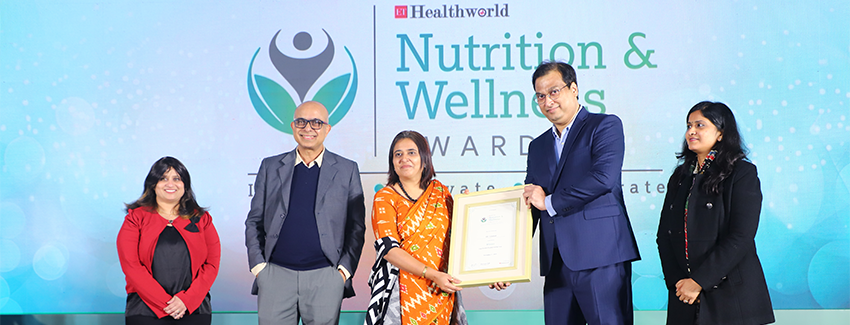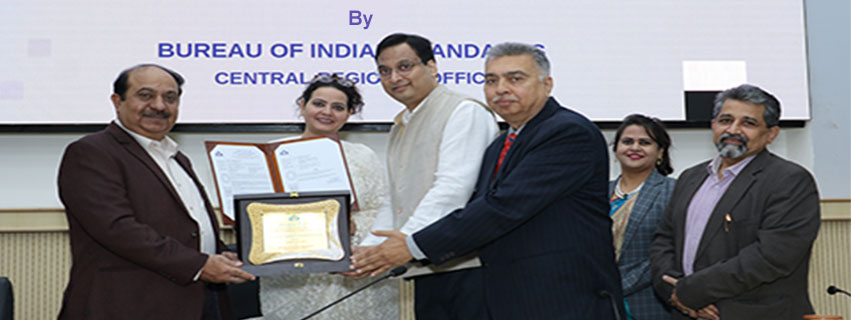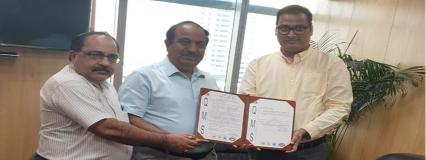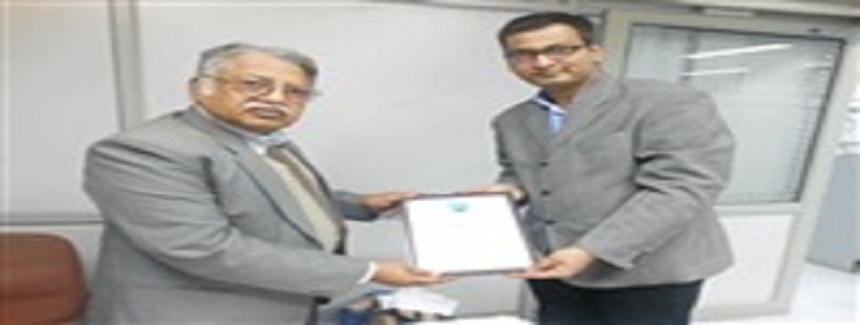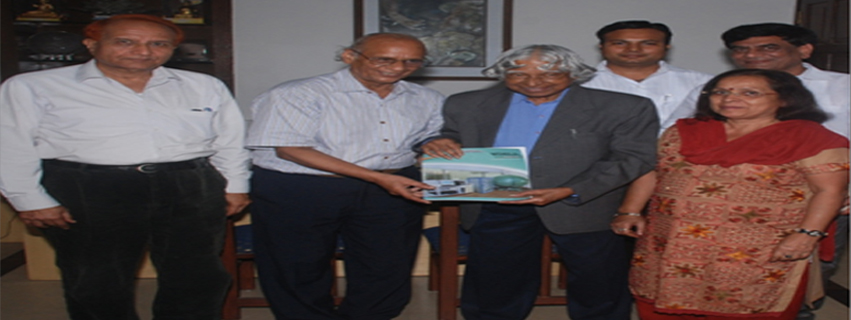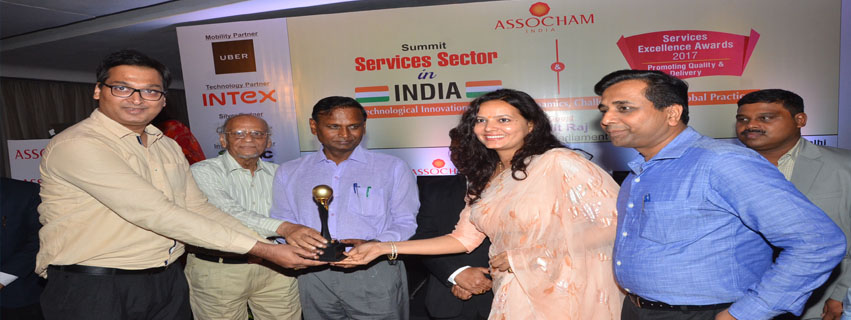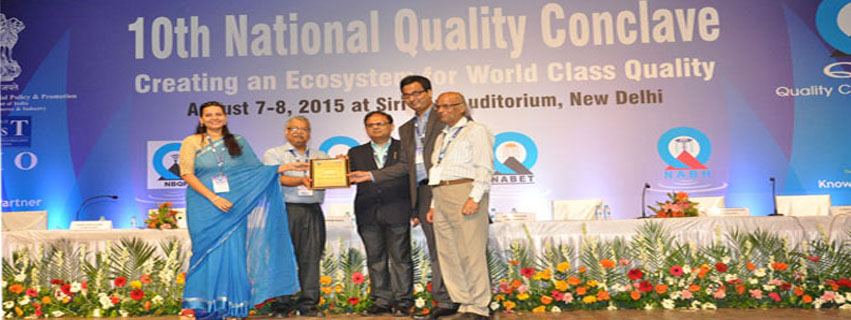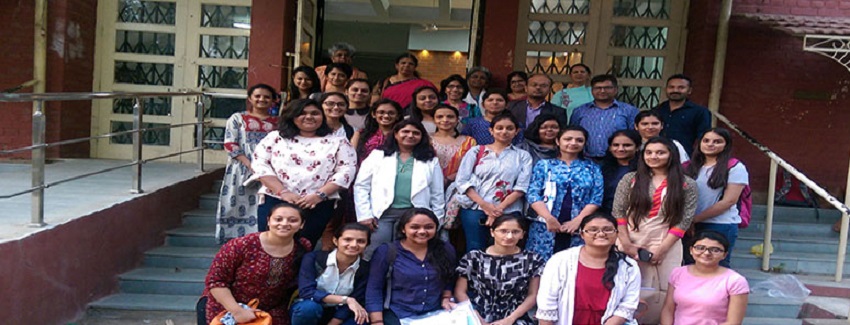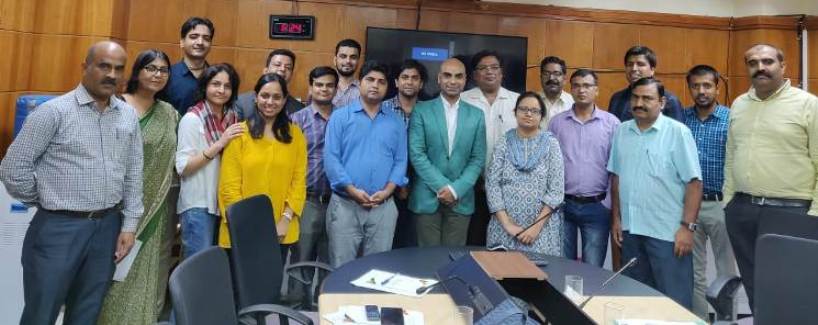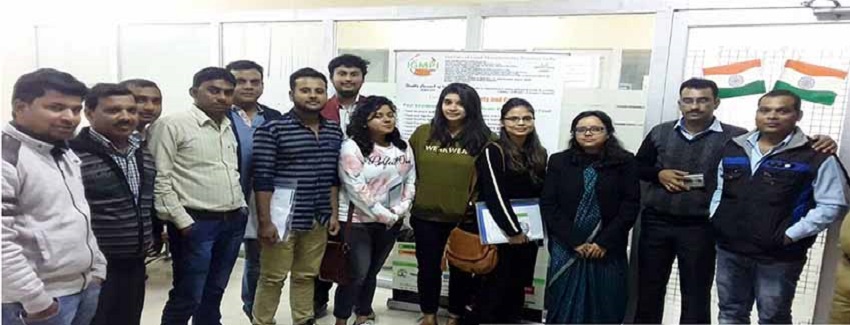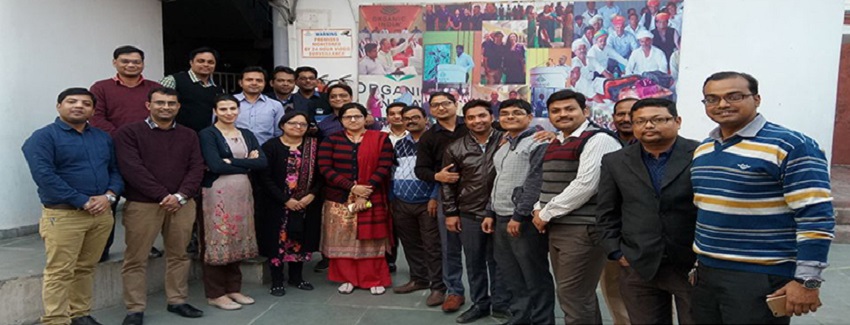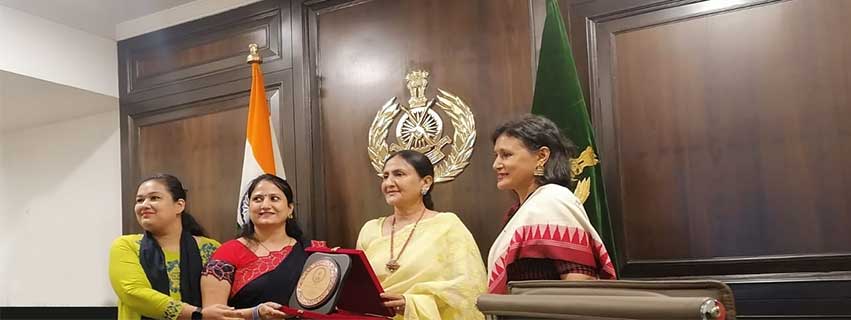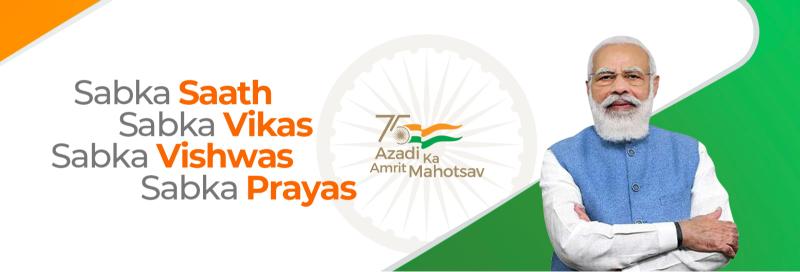(An Autonomous Body Recognized by Ministry of Commerce & Industry, Government of India)
Competency based placement focussed Education | Training | Research | Consultancy
Post Graduate Diploma/Executive Diploma in Geoinformatics (PGDGI/EDGI)
Remote sensing and GIS are indispensable tools today due to their extensive applications in tackling global challenges and enhancing decision-making. Remote sensing provides detailed, real-time data from satellites and aerial platforms, allowing for precise monitoring of environmental changes, natural disasters, and urban development. GIS integrates this spatial data with other datasets, enabling complex analysis and visualization. These technologies collectively support sustainable resource management, disaster response, climate change mitigation, and urban planning. By delivering accurate, actionable insights, remote sensing and GIS empower governments, businesses, and researchers to make informed decisions, ultimately fostering a more resilient and sustainable world.
The Post Graduate Diploma in Geoinformatics is a comprehensive program designed to equip students with advanced knowledge and practical skills in remote sensing and geospatial technologies. This course integrates theoretical foundations with hands-on experience, utilizing QGIS software. QGIS is ideal for this program because it is a powerful, open-source GIS software that offers extensive tools for spatial analysis, data visualization, and remote sensing applications. Its user-friendly interface and active community support make it accessible for learners, while its compatibility with various data formats ensures versatility in real-world projects. Using QGIS, students gain practical experience with industry-standard software without the cost barriers of proprietary systems.
Students will learn about remote sensing principles, sensor technology, data acquisition, and GIS spatial data models and analysis methods. Practical sessions include image processing, supervised and unsupervised classification, and integrating remote sensing data with GIS for enhanced decision-making. By the end of the program, diploma holders will be proficient in applying these technologies in various fields, including environmental management, urban planning, agriculture, and disaster management, making them valuable assets to employers.
Programme Structure
Module 1: Introduction to Geoinformatics
- Principles of Geoinformatics
- Overview of GIS and remote sensing, history, and development
- Basic concepts of GIS: spatial data, data models, and databases
- Introduction to remote sensing: principles, platforms, and sensors
- Applications of GIS and remote sensing in various fields
Module 2: Computer Cartography
- Introduction to map
- Concept of projection, coordinate system and datum
- Parameters of map
- Map generalization and interpretation
- Importance of computer mapping
Module 3: GIS Data Collection and Management
- Data sources and acquisition methods
- Data quality, accuracy, and standards
- Database management systems for GIS
- Data preprocessing and integration
Module 4: GIS Analysis and Visualization
- Spatial analysis techniques
- Geo-statistical analysis – Spatial interpolation, AHP
- Understanding 3D analysis in GIS
- Performing 3D analysis using Digital Elevation Model (DEM) data
- Hydrological Analysis using DEM data
Module 5: Remote Sensing Techniques and Applications
- Image acquisition and preprocessing
- Supervised classification techniques
- Unsupervised classification techniques
- Accuracy assessment
- Change detection, monitoring, and case studies in environmental monitoring, agriculture, and urban planning
Module 6: Advanced GIS and Remote Sensing Applications
- Integration of GIS and remote sensing
- Web GIS and cloud-based solutions
- Mobile GIS applications
- Emerging trends and future directions
Module 7: Surveying and field work (GPS)
- Introduction to Surveying Techniques
- Classical and Modern Surveying techniques
- Fundamental of positioning system – GPS components (space segment, control segment and user segment)
- Application of GPS and Field Survey
Module 8: Digital Photogrammetry
- Aerial Photography – Geometric characteristic of aerial photographs
- Photogrammetry –Development of photogrammetry, classification and uses of photogrammetry
- Photographic scale
- Working with aerial photographs
- Ortho Photo Generation
- Creation of DEM/DTM
Module 9: Lidar (Light Detection and Ranging)
- Fundamental of Lidar
- Types of Lidar (Airborne, Terrestrial and Mobile)
- Lidar data processing and classification
- Lidar Application and analysis
Module 10: Case Studies
Module 11: Capstone Project
Eligibility
Graduates in any discipline are eligible for our Post Graduate Diploma, Executive Diploma and Professional Certification Programmes.
Programme Duration
The minimum duration to complete the PG diploma programme is 12 months and maximum is 24 months. The minimum duration to complete the executive diploma programme is 6 months and maximum is 12 months.
Programme Mode
Registrations are currently open for regular and Part-time (Online Live Classes) both modes.
Programme Deliverables
A comprehensive study material for all the modules in hard copies ensuring the needs of the audience. The accompanying training material is appropriately aligned with the current Industry’s expectations.
- Assignments for all the programme modules for continuous evaluation and guidance.
- Interactive or online live sessions on all key areas of the programme giving all flexibility to the participants.
- Online Live Classes/Part-time for all the modules will be conducted on the weekends. Moreover, a doubt clearing session will also be scheduled before the examination.
- All the efforts are made by IGMPI faculty members to make the entire programme modules easily understandable.
- Assessment and evaluation for all the programme modules in order to enhance the levels of competencies and skills of the participants leading towards the objective of application in the job.
- At the end of each programme modules, the trainers shall obtain feedback from the participants using specially designed questionnaires.
- All learning and training delivery initiatives shall be conducted in English.
Examination & Certification
All the participants are obliged to timely submit completed assessment assignments (during the programme, usually after every module) and appear for an online proctored exam at the end of the programme. After successful completion, the participants will be awarded Post Graduate Diploma in Geoinformatics by Centre for Environmental Health and Safety, IGMPI. For all the above-mentioned modules elaborate programme material, self-assessment assignments and project work details would be provided by the Institute from time to time. Details get updated on the webpage as well.
Discipline in Classes and Examination
Every student is required to observe a disciplined behaviour during her/his classes, assessments & examinations and to follow instructions from the Professors. Any act of indiscipline may result into discredit & it will be mentioned in her/his academic report.
Placement Assistance & Corporate Relations
The institute collaborates with numerous organizations to offer placement support to participants enrolled in Post Graduate Diploma Programs. Additionally, it maintains a strong placement cell comprising experienced Human Resources professionals and Talent Acquisition specialists who maintain strong connections with various businesses and industries. This cell is consistently focused on enhancing the employability of our participants and advocating for their recruitment by engaging with Human Resources departments and Hiring Managers to fill their available positions. Furthermore, the efforts of our placement cell extend to assisting participants with professional resume writing and honing their interview skills.
Recently, the Institute has witnessed growing involvement from professionals working with global industry like Big 4, Accenture, SGS, Fortune 100, Uniqus Consultech Ltd., ESG Book, Vision 360, TCS, Ckinetics, CSE (Centre for Science and Environment, TERI (The Energy and Research Institute), Iforest, CEEW (Council on Energy, Environment and Water ), CPR (Centre for Policy and Research ), Centre for Energy and Environment Sustainability, WWF (Worl wildlife Fund ), IWMI (International Water Management Institute ), Greenpeace, 350.org, ATREE, Chintan Environmental Research and Action Group, Sankalp Taru Foundation, TBS, Tarun Bharat Sangh, Mukti, Aquatech Systems Asia Pvt. Ltd., Nalco Water India Ltd.(Ecolab),ABM Environment Consultants, Eco Paryavaran Engineers and Consultants Pvt. Ltd., Enviro, Paramount Ltd., Enviro Control Associates India Pvt Ltd., Energy Tech Solutions, CVR Labs, EnVision Environmental Services, Mindtree Ltd., Siemens, Wipro Limited, Astra Zeneca, Novartis Healthcare, Accenture, Larsen & Toubro Limited, Roche Pharmaceutical, PI Industries Ltd., Ericsson, Teva Pharmaceuticals, ICON Plc., Suven Life Sciences, Infosys Limited, Syneos Health Clinical, Eli Lilly and Company, etc. The IGMPI’s Corporate Resource Division actively recommends our students and training participants for various job requirements and specialized roles to Human Resource, Talent Acquisition as well as the heads of various departments in Pharmaceutical, Healthcare industries on regular basis.
Future career prospects
A diploma in Remote Sensing and GIS offers diverse career opportunities across sectors like environmental management, urban planning, disaster management, agroforestry, forestry and agriculture. The diploma holder can become GIS consultants, Environmental Analysts, or Urban Planners, creating and overseeing city plans and infrastructure projects. Other roles include Disaster Management Specialists, focusing on risk assessment and emergency response, and Agriculture Analysts, enhancing crop production and resource management through precision farming. The demand for professionals with these skills is high, driven by the growing need for data-driven decision-making and sustainable development.
Programme Fee Details
Programme fee details will appear here.
Last date for submitting completed Application Form: 13th Feb 2026.
For further enquiries, call or write to us on:
18001031071
(Toll Free -9:00 am to 5:30 pm IST-except on Central Government holidays)/
info@igmpi.ac.in
NEWSLETTER
Other Programmes
- Business Sustainability (PGDBS/EDBS)
- Remote Sensing and Geographic Information System (PGDRSGIS/EDRSGIS)
- Power Management (PGDPM/EDPM)
- Oil & Gas Technology and Management (PGDOGTM/EDOGTM)
- Petroleum Technology and Management (PGDPTM/EDPTM)
- Green Technologies (PGDGT/EDGT)
- Fire Technology & Industrial Safety Management (PGDFTISM/EDFTISM)
- Water Resource Technology and Management (PGDWRTM/EDWRTM)
- Urban Planning (PGDUP/EDUP)
- Public Policy and Sustainable Development (PGDPPSD/EDPPSD)
- Natural Resource and Biodiversity Management (PGDNRBM/EDNRBM)
- Corporate Affairs Management (PGDCAM/EDCAM)
- Business and Human Rights (PGDBHR/EDBHR)
- Climate Change Technology (PGDCCT/EDCCT)
- Environmental Law and Policy (PGDELP/EDELP)
- Environmental Social & Governance (PGDESG/EDESG)
- Disaster Management (PGDDM/EDDM)
- Waste Management (PGDWM/EDWM)
- Sustainable Agriculture (PGDSA/EDSA)
- Sustainable Development (PGDSD/EDSD)
- Environmental Studies and Resources Management (PGDESRM/EDESRM)
- Industrial Safety Management (PGDISM/EDISM)
- Renewable Energy Management (PGDREM/EDREM)
- Corporate Social Responsibility and Sustainable Management (PGDCSRSM/EDCSRSM)
- Environmental Health and Safety (PGDEHS/EDEHS)
- Industrial Hygiene (PGDIH/EDIH)

